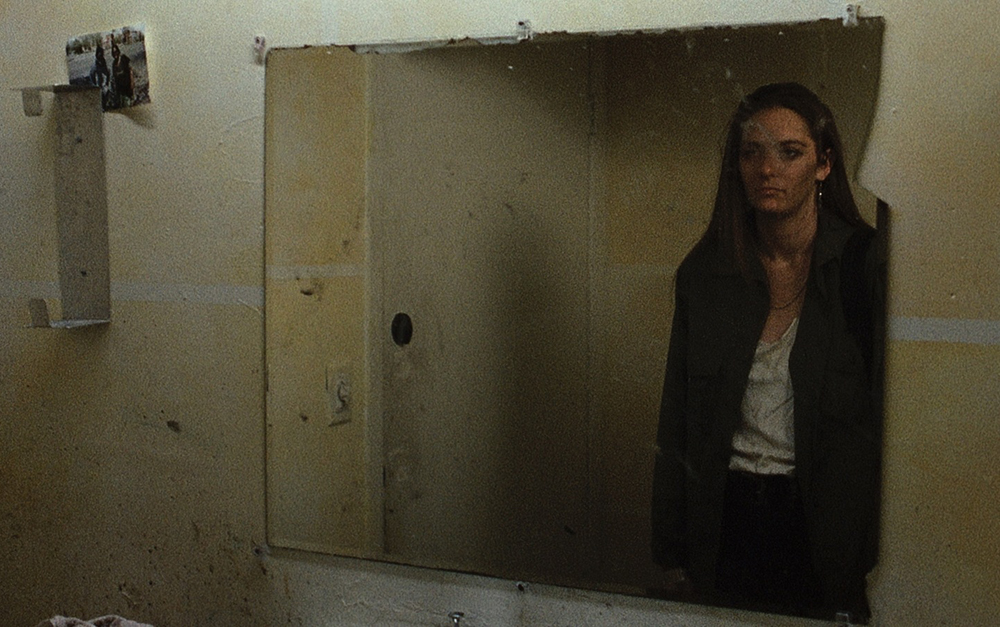“Remember Piper?” Red (Haley Isaacson) asks in “Warm Blood,” expecting you to know. You’ve only just met her in the parking lot of the River Road Market in Modesto, and while Red, always on the run, isn’t about to waste much time herself catching you up in Rick Charnoski’s nobly transgressive narrative debut, the director is more generous as Piper proceeds to beat her up, flooding the screen with a montage that’s just as violent of the years when the two young women were once friends, suggesting the two fell out after Piper had seduced Red’s father (or just as likely, the other way around) and now, Piper has one last piece of ammunition against her, asking her where he is now.
At first, that seems like the driving question of “Warm Blood,” but it’s a smokescreen for far larger ones in what feels like a lost piece of cinema from the No Wave era that reveled in the New York underground, only relocated to NorCal. “Warm Blood” is set just after No Wave’s heyday in 1988, throwing up the admonition “Based on a True Story” that comes across as an inside joke after an opening credits sequence replaces a list of the cast and crew with warnings of “sweat of hands and feet” and other potential bodily responses to what you’re about to see. You never know what’s true or not, as Charnoski and co-writers Amiel Courtin-Wilson and James Hewison devise a clever framing device as Red may never been in a mood for reflection, but you’re privy to her inner monologue in journal recordings she made in 1985 when her parents forced her into therapy, and took a half-off deal that would allow the therapists to keep the audio for vague internal purposes. To keep herself amused, Red admits to exaggerating the stories she’d confide to her recorder, but the habit to self-document continues after she no longer lives under her parents’ roof, instead drifting around town when she can’t stand her mother and her father is gone without a trace.
Red makes for an unlikely guide to a post-apocalyptic world, but when few take notice of her, she’s an appropriate choice for how “Warm Blood” envisions the end of the world, not with a bang, but a whimper when Modesto’s agricultural industry may be thriving, but its residents aren’t, strewn out in a wasteland that the wealthy extract what resources they can after hightailing it some time ago. With frequent Kelly Reichardt cinematographer Christopher Blauvelt around to help create a genuinely subterranean feel, the film follows Red into trailers and homes that look more like junkyards than living quarters, full of both trash and treasure that have become inseparable from one another when there’s a pervasive sense of resignation that nothing will improve. Red is a survivor, careful not to draw attention to herself as she steals food, cigarettes and even cars while others are distracted, but Charnoski implicates the audience in taking their eye off the ball as bits of news coverage of the chemical pollution of the local river are bound to serve as background noise as much for those on screen in its banal presentation yet give shape to the socioeconomic dynamic in Modesto where industrial producers reap profits without ever touching the ground, spraying crops with pesticides that the locals have to live – and often die – with.
If this makes “Warm Blood” sound in any way preachy, it is careful to tuck in any cultural critique as part of an argument against apathy on any front, wriggling out of any formal constraints that could be placed on it as Red moves in and out of reality in a literal sense as Isaacson is clearly engaging with interesting real-life residents of Modesto, but also in and out of her own mind where her grip on what’s happening to her may be looser than it appears, as well as lo-fi local television spots that grow increasingly surreal. Any analog-era sense of ironic detachment gives way to more sincere aims when there’s an obvious affection for the community the film’s set in and while the threat of it all disappearing looms large, preserving it on film becomes just one admirably defiant act of many.
“Warm Blood” does not yet have U.S. distribution.




